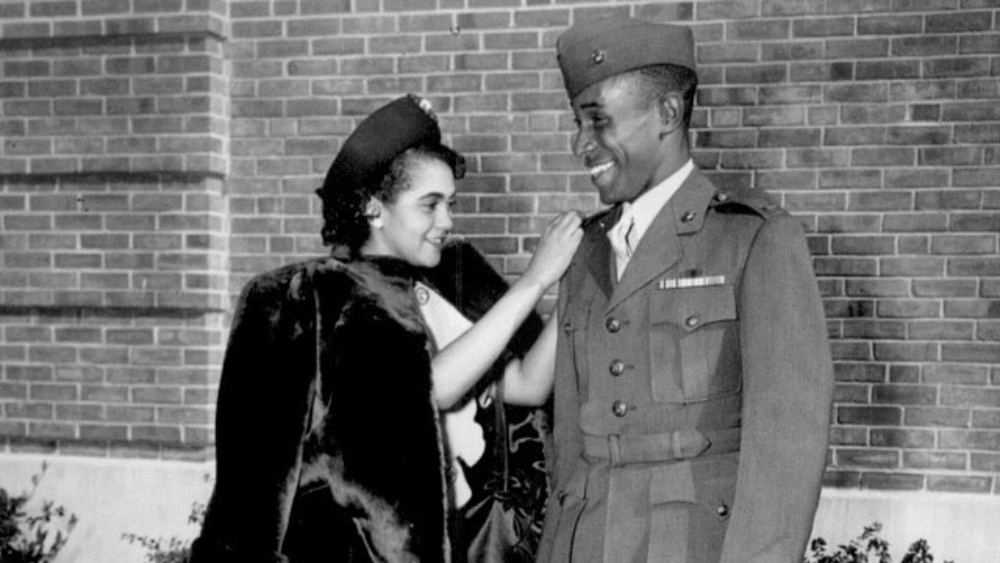Frederick C. Branch holds a special place in American military history as the first African American officer in the United States Marine Corps (USMC). His journey from segregation to a commission as a second lieutenant is a testament to perseverance, dedication, and the changing tides of American society. This blog explores Branch’s life, his impact on the military, and his lasting legacy in the armed forces and beyond.
Early Life and Education
Frederick C. Branch was born on May 31, 1922, in Hamlet, North Carolina. Raised in an era of segregation, he grew up in a society that imposed racial barriers at every turn. Despite these challenges, Branch excelled in academics and pursued higher education at Johnson C. Smith University before transferring to Temple University in Philadelphia, Pennsylvania. It was at Temple that he would later receive his commission into the USMC.
Military Service During World War II
Branch’s journey into the military began in 1943 when he was drafted into the United States Army. However, his aspirations went beyond being an enlisted soldier. He sought to become an officer but was denied entry into the officer candidate school due to racial discrimination. Undeterred, he pursued another route—enlisting in the Marine Corps, which had only recently begun accepting African American recruits following President Franklin D. Roosevelt’s Executive Order 8802, which prohibited racial discrimination in the defense industry and federal agencies.
Frederick C. Branch trained at Montford Point, a segregated boot camp in Jacksonville, North Carolina, specifically established for African American Marines. He demonstrated exceptional leadership skills and resilience, catching the attention of his superiors. His performance led to an opportunity to enroll in the Navy’s V-12 officer training program at Purdue University, marking a significant step toward breaking racial barriers within the military.
Becoming the First Black U.S. Marine Corps Officer
After successfully completing the V-12 program, Branch was admitted to Officer Candidate School (OCS) in 1945. On November 10, 1945, he made history by becoming the first African American commissioned officer in the United States Marine Corps. His commissioning as a second lieutenant was a milestone that paved the way for future generations of Black Marines.
Following his commission, Branch was assigned to command an all-Black unit in the Pacific during the final stages of World War II. Though the war ended before he saw combat, his presence in the officer ranks of the Marine Corps was a significant step toward integrating the military.
Post-War Military Career and Civilian Life
Despite his groundbreaking achievement, Branch faced challenges in advancing his career within the Marine Corps due to systemic racism. In 1952, after serving with distinction, he was honorably discharged. Choosing to apply his leadership skills in civilian life, Branch became an educator, teaching science in Philadelphia’s public school system. His transition to academia reflected his commitment to inspiring future generations.
Legacy and Impact
Frederick C. Branch’s legacy extends far beyond his personal achievements. His commission opened doors for African Americans in the Marine Corps, challenging racial barriers within one of the most traditionally segregated branches of the U.S. military. Today, his impact is recognized in multiple ways:
- Montford Point Marines Recognition: In 2012, the U.S. Congress awarded the Congressional Gold Medal to the Montford Point Marines, acknowledging their critical role in integrating the Marine Corps. As a product of Montford Point, Branch is forever linked to this historic group of pioneers.
- Frederick C. Branch Leadership Scholarship: The Naval Reserve Officers Training Corps (NROTC) established this scholarship to support minority students aspiring to become Marine Corps officers. The program continues to honor his legacy by fostering diversity and leadership within the Corps.
- Marine Corps Memorialization: His story is taught in Marine Corps training programs, ensuring that his contributions are never forgotten.
The Broader Context of Military Integration
Frederick C. Branch’s commission came at a time when the U.S. military was beginning to integrate. The efforts of African American soldiers, sailors, airmen, and Marines during World War II played a significant role in proving their capabilities and pushing for equality. In 1948, just a few years after Branch’s historic commission, President Harry S. Truman signed Executive Order 9981, which led to the desegregation of the U.S. Armed Forces.
The integration of the military was a crucial step toward the broader civil rights movement, demonstrating that racial equality was not only possible but essential for the strength of the nation. Figures like Branch served as both symbols of progress and active agents of change within their communities and institutions.
Frederick C. Branch Legacy
Frederick C. Branch’s legacy is one of courage, resilience, and leadership. As the first African American officer in the United States Marine Corps, he paved the way for countless others to serve with honor and distinction. His journey from a segregated boot camp to an officer’s commission exemplifies the fight for racial equality in America’s military institutions. Today, his name stands as a testament to breaking barriers, inspiring future generations to serve and lead with excellence.
Through the Frederick C. Branch Leadership Scholarship, his contributions continue to empower aspiring officers, ensuring that his impact on the Marine Corps and American society endures. As we reflect on his achievements, we recognize that his pioneering spirit remains a beacon of hope and progress in the ongoing pursuit of equality and justice.











